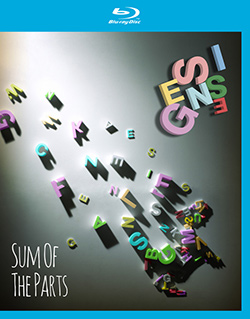


In early 2014, new photos of the “classic” Genesis lineup were taken and published later that year with the announcement that there would soon be a new BBC documentary called Together And Apart about the band. As it turned out, this was supposed to be part of a larger campaign probably aimed at getting Genesis back into the public discourse again. Additionally there will be a new 3CD set called R-Kive, which – in contrast to the Platinum Collection – also includes solo songs by the 5 musicians. Thus, it's reasonable to assume that Genesis is to be marketed as a “family” from now on. Along with R-Kive and the re-release of Three Sides Live, the BBC documentary will also be released on DVD and Blu-ray under the title Sum Of The Parts in November 2014.
Genesis 2014 – it wasn't off to a bad start. Current photos of the 'Fab Five' surfaced, there were mysterious hints about 'exciting news' and somehow there was hope that something very exciting was about to happen. It didn't happen though. First, the 'exciting news' turned out to be a new compilation without any new material – including the solo songs was the only new aspect. But then the fans pricked up their ears when it was revealed that the band had been working on a new documentary together. Even the title, Sum Of The Parts, gave reason to hope for something good. After 45 years, Genesis finally seemed to view itself as the sum of its parts. It was enough to merit some curiosity. But Sum Of The Parts is little more than another sub-standard TV documentary. In fact, Sum Of The Parts is a slapdash documentary, showing a distorted picture of the band's history and bluntly revealing the conditions within the band. It's also proof of how little Genesis is connected with its fans.
What in the world happened?

The documentary has a running time of about 90 minutes and will be published by Eagle Vision on 17 November 2014. It was already broadcast by the BBC in England and was also aired on TV in America. The main menu is quite modest – the letters w, s, l, f, h, k, r can be seen, but that probably doesn't mean anything. Turn It On Again is playing to the background images from the 2007 tour, the Invisible Touch Tour and the Misunderstanding video – all in the usual infinite loop.
The documentary is structured chronologically with a few side trips to the solo careers. However, it starts with the most current images from the 2007 tour, features a few statements (the misspelling of Daryl Stuermer as 'Steurmer' is already striking) and then takes a step back – to the Charterhouse. During the early phase there are interviews with some of the protagonists of that time. Richard Macphail and also Jonathan King are featured here, whose participation has been the cause of some discussion beforehand. Fans don't really get to know or see anything new – until a snippet from the famous Roundhouse recordings. It doesn't matter here that the sound has a different source – the Roundhouse recording is cult like few other things since we see Anthony Philips on stage and even behind the mic. The arc of suspense is great during this phase of the documentary. Anthony Philips is established as the driving force and head of the band and his leaving is well documented and commented on. Ant's comment regarding the exit is accordingly humorous “If I hadn't left, they may never have got Phil Collins” …
Like Ant's exit, Phil Collins's and Steve Hackett's joining the band are covered adequately. The documentary also shows here how important these entirely different characters were for the band. The impression that Phil's arrival changed the band immediately and may have been more decisive than Steve's is illustrated quite clearly and definitely understandable – Steve's influence was much more subtle and slower while Phil's drumming had an immediate impact on the band.
The start of the “Genesis conquers America” part is something of a weird moment. Interestingly enough, there's an interview with the band's first promoter in the US, but the images from New York are current and not from the 70s – since it says “New York 1972” this seems quite unprofessional.
The next few albums are handled very well. Gabriel's costumes and the big break with Foxtrot, the sound of Selling England By The Pound (which is given way too little time here though), the creation of The Lamb Lies Down On Broadway – during these parts, the documentary really shows how good it could have been. The first irritating bit is when Tony drops a slightly unfortunate comment about the Firth Of Fifth solo. It was already going around the web, but was taken a little out of context. Tony's remarks about how everyone (besides Phil) was somewhat stiff back then, which also affected Steve's solo, is illustrated by a current interpretation by Daryl Stuermer in the studio. Every director should be aware of the original's cult status. This scene is the first major mistake in the documentary.
A little later, we have one of Steve's rare comments – about his first solo album this time. He explains his motives and apologizes for his step a little tongue in cheek. Tony's face in that scene speaks volumes though...
Talking about a scene: especially the images with all five were used to promote the documentary. However, at the end of the Gabriel era the interview scenes in that group configuration are few and far between – and even worse, it feels like Hackett was often cut out of the picture on purpose. It's mostly Tony, Phil, Mike and sometimes Gabriel on screen. Or Gabriel and Banks. This is the first time it gives the impression of a 'Tony Banks Show'.
While Gabriel's exit was accompanied by a short side trip into his solo career up until about 1980, Steve's solo works haven't been brought up at all apart from his explanation for his first album – even though he had been the first to release a solo album back then. The Genesis album Wind & Wuthering is also pretty much disregarded. We only get to hear Your Own Special Way very briefly, without the usual presentation of the cover along with some data (date of release, rank in the charts). There is an interesting side trip, regarding the development of Collins's drum sound on Peter Gabriel's 3rd album. This is also where we get to scenes from the interview with all five for the last time.
During the 80s, a few problems with the dramatic composition start to crop up. This alone isn't all that bad since it would probably be difficult for any director to find a balance between all the solo careers and what's happening with the band. There's still barely any Steve in the documentary's 80s while Tony Banks is featured with a lot of quite poor songs. Invisible Touch is given far too much time, but the band also seems to be very focused on the success here. Finally, We Can't Dance is discussed as “the band's last transatlantic top 10 album”. Tony remarks that he somehow had that feeling of “that's it” with the last single Tell Me Why. This is followed by a jump to the 2006 band rehearsals (not 2007 as the subtitle indicates) and we're left to wonder whether the years 1993-2006 never really happened. In fact there's only a brief bit of You'll Be In My Heart and a few comments about Tony's classical projects and a few other songs from his solo career. Calling All Stations is left out entirely, even though it is a regular Genesis album and definitely interesting simply because it was created without Collins. Never mind that it managed to reach No. 2 in the German and UK album charts – both huge markets – and that the Europe tour was quite successful.
Over the course of the documentary, it's increasingly clear that 4-5 of the interviewees and experts are featured strikingly often. It's somewhat surprising that Kate Mossman has so much to tell about the 70s. Mossman is arts director and pop critic for the New Statesman, a popular English news website. However, hardly anyone had heard anything about her in connection with Genesis prior to Sum Of The Parts. There are a few others who are just as excessively featured as Kate: Mark Billingham is a novelist and even though the reason for him being involved isn't exactly obvious, he often manages to hit the nail right on the head. Al Murray, a popular comedian, is a Genesis fan himself. He “defends the band to the last” and is also the source of the documentary's essential quote: “Genesis are the Progressive Rock Band who progressed”.
Angie Greaves is a radio DJ for London's Magic 105.4 FM. Her involvement is probably due to her starting out with the BBC. Music journalist Chris Roberts is featured all throughout the documentary like Kate, Angie and Al. He is known through the website Rock'sBackpages. David Roberts is featured only once; he is responsible for the Rock Chronicles. The mix of the above mentioned people seems a little strange. Chris Welch and Armando Gallo weren't chosen, but the criteria for selecting the other participants seem quite random. However, Ed Goodgold, the first North America tour promoter, who had never been featured in a documentary before, is quite an interesting choice.
Fans are practically not represented and even their manager Tony Smith is shown only rarely. Bill Bruford, whose role in the band's history can hardly be called insignificant, also isn't featured, just like the 1997/98 line-up with Ray Wilson. Other important protagonists were left out as well: Armando Gallo, Paul Whitehead, who designed the band's first album covers, John Burns and David Hentschel, who influenced the band's early sound. At least Hugh Padgam was interviewed as part of the coverage of the important development of Collins's legendary drum sound. Nick Davis also wasn't interviewed. The earlier drummers Chris Stewart and John Silver don't make an appearance – unfortunately, John Mayhew couldn't be interviewed anymore, of course. The credits reveal some other apparently unused interviews – Sebastien Lamothe and Marc LaFlamme of The Musical Box are named among others.
Just like R-Kive, Sum Of The Parts also has a comprehensive booklet. The accompanying text is basically identical to the one from R-Kive, but a little more detailed. However, the frequent references to R-Kive seem a little strange. It's even worse that it's emphasized from the very beginning how balanced the documentary is. Booklets are not the standard with DVDs and Blu-rays (for example Three Sides Live doesn't have one), but the contents seem more than a little strange here – almost like Satire.
Of course, there were lots of unused interview scenes. The bonus material is entirely composed of individual interviews and Steve Hackett is also completely absent again. Anthony Phillips and Ray Wilson are missing from the bonus material as well. The material is mostly very raw, we often hear the question or the a raw version of an answer. There are some interesting statements at times, though. Peter Gabriel gives us the weirdest scene by standing up in the middle of a question to take a cup of ginger tea that was brought to him even though he had asked for coffee. Everything is well documented and has German subtitles, should you want them.
The bonus material's emotional lowpoint is the part “Phil Collins on the Future”. It's basically one minute of him hardly saying anything and should make clear that something new with Genesis or solo is further away than recent events had suggested. Of course, he doesn't rule out anything, but he isn't motivated enough for anything to happen. He seems resigned and unenthusiastic.
One could argue, of course, that the average consumer doesn't care about these flaws making it a fun documentary for them. Maybe. Only the way it was made just isn't right. It's difficult to find the right words, but it's definitely imbalanced. It's almost unbelievable that a product like this was marketed as a “balanced product” and then basically cuts out a member completely. Steve Hackett has already addressed this issue and will not offer the documentary on his website. That's a slap in the face. Of course, the average consumer won't notice any of this, but does that justify painting a completely distorted picture of the band? No!
Sum Of The Parts is the sad lowpoint of a marketing campaign that failed completely. It reveals a complete disconnect. The shit storm after the “exciting news”, the production of a documentary like this and how the situation was handled as a whole unfortunately only mean four things: the band won't do anything together anymore. Internal disputes that used to be mere speculation were revealed beyond doubt and visible for everyone in the documentary. The management doesn't understand a thing about the dynamics on the internet and the band apparently doesn't care about their fans. Until they prove us otherwise.
Because in the end, absolutely nothing official will be done for the 40th anniversary of The Lamb Lies Down On Broadway, possibly the most ambitious work in Genesis' history. The fans will celebrate for themselves and that's probably for the best.
Technical details of the release:
Formats: Blu-ray,DVD
Screen Format: 16:9
Sound: DTS-HD Master Audio, LPCM Stereo (Blu-ray)
Running Time: 124 mins approx.
Region: Region Free
Subtitles: English, French, German, Spanish, Italian




Package with live 2CD/DVD and new Stiltskin album. Available also as MP3 album.